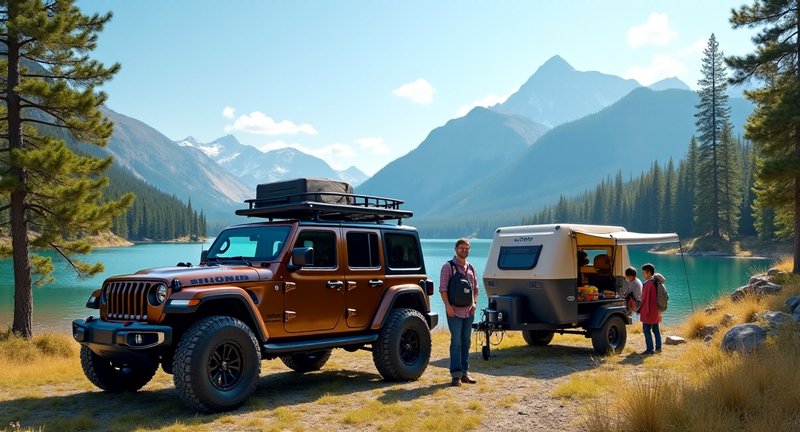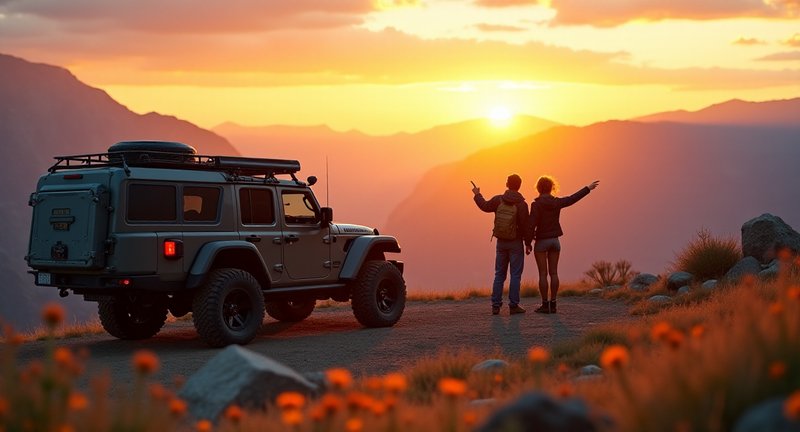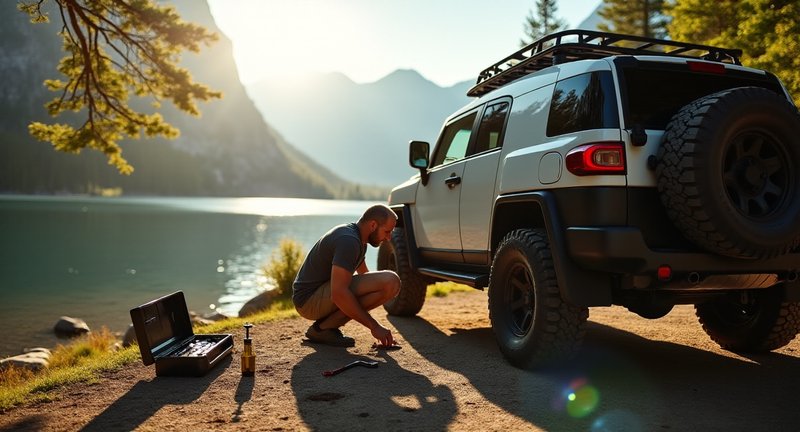Introduction to Jeep and Trailer
When I first laid eyes on a Jeep and Trailer combo, it felt like I had stumbled upon a hidden treasure. The rugged charm of a Jeep paired with the adventurous spirit of a trailer is hard to resist.
Every time I hit the road with my Off-road vehicle and camper, I’m enveloped in a sense of freedom that’s simply exhilarating. It’s like a call to the wild, inviting me to explore the uncharted territories of my surroundings.
The versatility of a Jeep is remarkable, but add a trailer into the mix, and you’ve got an unstoppable duo. Whether it’s camping gear, bikes, or even a kayak, I can haul it all without a worry in the world.

I remember my first trip with my Suv and hitch, navigating rocky paths and winding trails. The thrill of conquering obstacles, all while my gear remained secure behind me, was nothing short of liberating.
Let’s not forget the community that comes with owning a Adventure rig and caravan. It’s a bond that transcends words, where every wave and nod from fellow enthusiasts feels like an unspoken promise of adventure.
In my experience, the best memories are forged on the open road with a 4×4 and mobile home as my trusted companions. So, if you’re contemplating this dynamic duo, I say go for it you won’t regret the journeys that await.
The Adventure of Jeep and Trailer Combinations
When I think of thrilling escapades in the great outdoors, my mind races to those sturdy vehicles paired with rugged haulers. There’s something incredibly liberating about loading up your four-wheeled beast with gear and heading off into the wild unknown. Let’s explore why this combination is a quintessential choice for adventure seekers like us.
The Allure of Combining Power and Storage:
- Versatility: You can adapt your setup for any journey, whether it’s a weekend camping trip or an extended road expedition.
- Capacity: You can transport everything from kayaks to camping equipment without worrying about space. It’s like bringing your home along for the ride!
- Off-Roading Potential: Many of these vehicles are designed to tackle challenging terrains, ensuring you can venture where others might hesitate.
Personal Experience:

On a recent trip, I loaded up my sturdy companion with supplies for a week-long adventure. The thrill of the open road beckoned, and I was ready to embrace it. The moment I hit the trails, I felt the rush of freedom as we bounced over rocky paths and through wooded trails. I marveled at the stunning vistas unfolding before me, all while knowing that my trusty setup was equipped to handle whatever nature threw at us.
So, if you’re contemplating this adventure yourself, I can’t recommend it enough. The joy of exploration, the ability to tackle diverse landscapes, and the thrill of camping under the stars all await. Ready your gear, find your perfect setup, and set out to create unforgettable memories.
Understanding Towing Basics
Understanding the nuances of towing can feel like diving into a sea of jargon and technicalities. But fear not! I remember my first foray into this world; it was a mix of excitement and nervousness. Let’s break down the essentials, shall we?
First off, the fundamentals of towing hinge on a few key components:
-
Weight Ratings: Always check your vehicle’s towing capacity. This number is crucial going beyond it can lead to disastrous consequences.
-
Hitch Types: Understanding the various hitch systems is essential. Whether it’s a weight-distributing hitch or a simple ball mount, each has its purpose and benefits.
-
Safety Chains: Never underestimate the importance of safety chains. They act as a backup connection should your primary hitch fail. Cross them underneath the tow bar for added security.
-
Braking Systems: Depending on the weight of what you’re towing, you might need a supplemental braking system. This ensures smooth stops, preventing swaying and ensuring safety.
-
Load Distribution: How you load your cargo matters. Distributing weight evenly will keep your towing experience stable and reduce the risk of fishtailing.
With these basics in mind, I invite you to explore the joy of towing! There’s nothing quite like the thrill of hitting the open road, knowing you’re prepared for whatever adventure lies ahead. Embrace the learning process, and soon enough, you’ll find towing to be second nature.
Choosing the Right Vehicle for Hauling
Choosing the right vehicle for hauling is akin to selecting the perfect partner for a dance. Each needs to complement the other, ensuring that you glide smoothly through your adventures.
When I first dipped my toes into the world of hauling, I quickly realized that not all vehicles are created equal. Some are built for strength, while others charm with their agility. It’s essential to find that balance.
Think about your hauling needs. Are you ferrying a mountain of gear for a weekend getaway or transporting delicate treasures? The vehicle must match the task like a well-fitted glove, ready to take on the challenge without breaking a sweat.
I remember the excitement of loading up my trusty companion for a camping trip. The thrill of knowing it could tackle any rugged path and handle the weight with grace filled me with confidence. That connection is vital when choosing your hauling partner.
Additionally, don’t overlook comfort and convenience. You want a vehicle that not only hauls but also invites you in for the long haul. After all, nothing dampens the spirit of adventure like an uncomfortable ride.
In essence, the right vehicle is your steadfast companion, ready to journey into the unknown. Make your choice wisely, and you’ll create memories that will last a lifetime.
Key Specifications for Towing Capacity
In relation to towing capacity, understanding the key specifications can feel like decoding an ancient language. From my own adventures, I can assure you that grasping these specs transforms your outdoor experience, ensuring you’re not just towing but towing confidently. Here’s a breakdown of what you need to consider:
1. Maximum Towing Capacity
This is the grand number you see in the specs sheet, representing the heaviest load your vehicle can tow. It’s essential to respect this limit; going beyond it can lead to disastrous outcomes. Always check the manufacturer’s guidelines for this figure.
2. Gross Vehicle Weight Rating (GVWR)
Think of this as the maximum weight your vehicle can handle, including its own weight and any cargo. Understanding this helps you gauge how much you can safely pull without risking a mishap.
3. Tongue Weight
This is the downward force the trailer exerts on the hitch. Ideally, it should be about 10-15% of the total trailer weight. This balance ensures stability while driving nobody wants a swaying load on the highway!
4. Axle Ratio
This quirky spec refers to the ratio of the driveshaft to the axle. A lower ratio enhances torque, making it easier to pull heavy loads, while a higher ratio can improve fuel efficiency. Choose wisely based on your towing needs.
5. Hitch Type
There are different hitch classes designed for varying weights. It’s crucial to match your hitch to both your vehicle and the trailer to maintain a seamless connection.
In my experience, knowing these specifications transforms the daunting task of towing into an enjoyable journey. So, before you hit the road, dive deep into these figures and let your adventures flourish without a hitch!
Essential Features for Off-Roading with a Trailer
Considering off-roading with a trailer, one thing I’ve learned is that not all trailers are built to handle the rugged terrain. You can’t just hook up any old thing and expect it to survive a weekend in the wild. First up, you need something with serious suspension those bumps and dips are going to shake you, and your gear, to the core if you’re not prepared.
Another feature I swear by is reinforced tires. Off-road tires are not just about looking tough; they’re about surviving jagged rocks, unpredictable mud pits, and uneven paths that pop up without warning. Trust me, regular tires won’t last five minutes on those trails.
Weight distribution is another biggie. Trailers meant for off-road should have their weight balanced evenly, or you’re going to struggle on hills and turns. The last thing you want is to feel the trailer dragging you backward when you’re climbing a steep incline.
As a matter of fact, think about ground clearance. It sounds basic, but if you’re planning to head into rocky, rugged areas, you need enough height to avoid scraping the belly of your trailer. I’ve seen people stranded because they didn’t think about how their trailer’s undercarriage would handle the terrain.
Lighting is a bonus feature. If you’re out in the sticks, you’ll need extra lighting for those pitch-black nights. And believe me, those nights get dark. An LED setup on the trailer can be a game-changer when you’re setting up camp or navigating narrow paths after sunset.
Preparing Your SUV for Towing
With respect to towing, your SUV becomes your trusty steed, and you need it prepped for the challenge ahead. The first thing I always check is the hitch make sure it’s rated to handle the weight you’re towing, and that it’s snug as a bug in a rug. A loose hitch is like a wobbly handshake nobody feels good about it.
Next, you want to double-check your braking system. Trust me, once you’ve felt the strain of stopping a load that’s heavier than your SUV alone, you’ll never forget the importance of well-functioning brakes. I’ve been there, and it’s not a place you want to visit.
Another trick of the trade? Keep an eye on your tires. Not just the usual pressure check though that’s vital but also consider the load rating. Towing puts your tires to the test, and the wrong ones can turn an easy drive into a white-knuckle nightmare.
Don’t forget about those mirrors. Standard side mirrors? They won’t cut it when you’re hauling something substantial. I’ve found that a set of tow mirrors, which extend your field of vision, can be a real game changer.
As a matter of fact, distribute your load properly. It’s not glamorous, but packing your cargo with more weight at the front can make all the difference in stability. You’re not just packing for a picnic here you’re balancing your entire setup for a smoother ride.
Importance of Weight Distribution
When it comes to hitting the road with your off-road vehicle and pulling something behind, the way you balance weight can make or break your entire adventure. From personal experience, it’s not just about what you’re carrying, but how you’re carrying it.
First, you need to ensure the center of gravity is in check. I’ve seen setups that look great but handle like a brick on wheels because the load was too high or uneven. Always strive for low and centered weight distribution; this will give you the best control on steep slopes and rough terrains.
Here’s something you might not have considered: tire wear. Improper weight distribution doesn’t just affect steering, it can also cause uneven tire wear, leading to premature replacements. In my early days, I learned this the hard way after an otherwise perfect trip left me with two nearly bald tires on one side.
Now, let’s talk about braking. When your load is uneven, it places extra stress on your braking system. This isn’t just about stopping power uneven weight can cause your vehicle to pull to one side when braking, and trust me, that’s not a fun experience when you’re descending a mountain trail.
Here are a few tips to ensure you’re spreading the load right:
- Keep heavy items as low and close to the axle as possible.
- Evenly distribute weight side to side to avoid swaying.
- Don’t forget tongue weight. Too much or too little weight at the front can affect steering.
Get this balance right, and your journey will feel a lot smoother and safer!
Trailer Types: Which is Best for You?
When you’re ready to hit the open road, finding the right trailer type to pair with your ‘Jeep and Trailer’ setup can make all the difference in your adventures. From my own experiences, not all trailers are created equal each has its quirks, strengths, and weaknesses.
Let’s break it down into three main types that I’ve found to be the most practical:
-
Teardrop Trailers: If you’re after minimalism with a dash of nostalgia, these small but mighty trailers are perfect for solo trips or a weekend getaway with a partner. They’re easy to tow, lightweight, and don’t bog down your Jeep’s performance. Plus, they’re just plain fun to park almost anywhere.
-
Pop-Up Campers: Now, if you crave a little more space without committing to a full-sized RV, pop-up campers are a solid option. I’ve taken mine on some backcountry trips where a full-size camper would’ve been a nightmare. They fold down compactly but expand into surprisingly roomy setups, perfect for families or groups.
-
Utility Trailers: Sometimes, it’s all about practicality. When you’ve got to haul gear whether that’s camping equipment, bikes, or even your fishing kayak a simple utility trailer can do wonders. They’re rugged and versatile, designed to haul heavy loads without much fuss. I’ve loaded mine with everything from camping gear to surfboards.
Choosing the best trailer is really about matching your lifestyle. Whether you’re planning a cross-country expedition or just a weekend escape, the right trailer can elevate your experience. And trust me, once you’ve got your Jeep with a camper dialed in, the road is your playground.
How to Select the Right Tow Hitch
Considering selecting the right tow hitch, it’s not just about grabbing the first one you see at the store. There’s a bit of an art to it, and I’ve learned from experience that you need to ask yourself a few key questions before making the call. First, consider the type of vehicle you’re driving and what you plan to haul. Some hitches are built for heavy-duty pulling, while others are perfect for smaller loads. You wouldn’t want to mismatch and end up with a hitch that can’t handle the weight trust me, that’s a headache you can avoid!
Key Considerations:
-
Weight Capacity: Every tow hitch has a maximum weight it can handle, known as the Gross Trailer Weight (GTW). You’ll want to make sure that your hitch matches or exceeds the load you’re hauling.
-
Class Rating: Hitches are categorized into classes (Class I, II, III, etc.), which range from light-duty to heavy-duty. Make sure the class aligns with your vehicle’s capabilities and your towing needs.
-
Receiver Size: Most hitches come with a receiver size, typically 1.25 inches or 2 inches. Double-check that your towing setup, like the ball mount or other accessories, fits snugly into the hitch receiver.
-
Installation Process: Some hitches require professional installation, while others you can install yourself with the right tools and a bit of patience. I’ve found that a DIY install can be pretty rewarding, but don’t hesitate to call in help if you need it.
By keeping these factors in mind, you’ll make sure your towing experience is smooth and safe. The last thing you want is a poorly selected hitch to put a damper on your trip. It’s worth taking the time to choose carefully, so you can hit the road with confidence.
Safe Driving Tips When Towing
When towing, safety isn’t something to compromise, and trust me, you don’t want to learn these lessons the hard way. Over the years, I’ve gathered a few golden rules from my own experiences, and I’ll share them with you here.
First, get familiar with your load. Knowing your vehicle’s towing capacity is more than just looking at numbers understanding how that weight impacts acceleration, braking, and turning is key.
Here’s a few tips to keep in mind:
-
Distribute Weight Evenly: Uneven loads can throw off your center of gravity. It’s like trying to balance on one foot while carrying a heavy bag keep things as balanced as possible.
-
Braking Distance: Your stopping power takes a hit with the extra weight. Always give yourself extra room when braking, and trust me, you’ll feel grateful for that extra cushion if something sudden happens.
-
Drive Steady: I’m all for adventure, but when towing, smooth and steady driving is your best friend. Sudden turns or jerky movements? Not worth the risk.
-
Mind the Speed Limits: Speed limits are not just recommendations. Towing puts extra strain on your vehicle, and pushing your speed beyond what’s safe can cause swaying or even jackknifing both of which are a nightmare.
-
Wide Turns Are Essential: Ever clipped a curb because you underestimated your turning radius? Guilty. Take your turns wider than usual, especially when navigating tighter roads.
In the end, it’s about patience. Driving with a load in tow isn’t just about getting from point A to point B, but getting there in one piece. Keep it cool, stay alert, and make the journey as enjoyable as the destination.
Maintenance Tips for Towed Vehicles
When you’re towing a vehicle behind, it’s not just about the thrill of the adventure; it’s also about keeping everything in tip-top shape. I’ve learned the hard way that regular checks are more than just a precaution they’re a necessity.
First things first, always inspect your tow hitch and connections before hitting the road. It might seem like a no-brainer, but I’ve seen folks forget and end up with a disaster they never saw coming. I’ve found that a little double-checking goes a long way.
Next, give those tires some love. Both the towed vehicle and the towing vehicle deserve equal attention. I like to make sure the tire pressure is just right because you don’t want a flat ruining your day halfway through your trip.

Another often-overlooked area is the electrical system. I’ve had my share of flickering brake lights, and trust me, you don’t want to be that person on the road. Test all your lights, signals, and brake connections regularly to keep yourself and others safe.
Also, don’t underestimate the power of a well-lubricated tow hitch. A squeaky or stiff hitch can make turns tricky, so keep it greased and smooth. This little trick has saved me a lot of headaches in the long run.
As a matter of fact, take a good look under the vehicles. Loose bolts or leaky fluids can spell trouble later on. A quick peek before each journey ensures you’re ready for the road ahead.
A Detailed Guide to Jeep and Trailer
Let me tell you, combining a sturdy off-roader with a trusty companion hitched to the back is like unlocking endless travel possibilities. Whether you’re hitting backcountry trails or cruising down coastal highways, having a robust setup is the perfect invitation for adventure.
The real beauty is in the freedom it gives you. No more stressing about finding accommodations when you can bring your own little shelter along for the ride. Trust me, there’s nothing like pulling up to a secluded spot, setting up camp, and watching the stars light up the night sky.
But it’s not just about the thrill of exploration; it’s also about the details. From matching tires to choosing the right hitch, every part matters. And once you’ve got it all dialed in, you’ll feel like you’re on top of the world. It’s that feeling of independence of truly being able to take on any terrain.
Let’s not forget about practicality, though. Having all your gear stowed and ready for anything is a game-changer. Whether it’s for an overnight fishing trip or a month-long cross-country journey, there’s space for everything you need. Your mobile setup becomes a hub for all the action.
In the end, it’s more than just a vehicle and a camper. It’s a lifestyle, a ticket to endless escapades. If you’ve been thinking about taking the plunge, I say go for it. You’ll find that the road is calling, and now, you’re finally ready to answer.
Common Mistakes to Avoid When Hauling
When hauling for the first time, it’s easy to make rookie mistakes. Trust me, I’ve been there. To avoid frustration and a lot of unnecessary hassle, let’s go over some of the common errors I’ve learned to steer clear of over the years.
First off, overloading is a major no-no. You might think you can push the limits of your towing vehicle, but the strain you’ll put on it isn’t worth the risk. Always check your vehicle’s weight limits, including the trailer and cargo. Not only does overloading mess with handling, but it also puts unnecessary stress on your engine and brakes.
Another frequent mistake is neglecting proper weight distribution. You don’t want too much weight at the front or back of the trailer. Always ensure the load is evenly spread out to avoid swaying or loss of control. Think of it like balancing a seesaw you want stability, not chaos.
Don’t overlook the importance of checking your tire pressure. Low tire pressure on either the vehicle or the trailer can lead to poor fuel efficiency and even blowouts. Keep a pressure gauge handy, and don’t trust your eyes get the numbers right.
Skipping a pre-trip inspection is another big error. Make a checklist and go over it each time you haul. Ensure your hitch is secure, lights are working, and safety chains are attached. This habit saves you from dealing with problems that often crop up when you least expect them.
Also, avoid sharp turns and sudden stops. Slow and steady is the key here, especially when towing something heavy. It’s not a race; take it easy and stay safe.
The Role of Braking Systems in Towing
In the context of towing, the braking system plays a crucial role in ensuring a smooth and safe experience. From my time on the road, I’ve learned that one of the most underrated factors in towing is understanding how different braking systems can either make or break your trip literally.
First off, let’s talk about what you’re dealing with. Your vehicle’s brakes are already designed to handle its own weight. Now, add the weight of whatever you’re towing, and suddenly, your brakes are under a lot more pressure. Not every braking system is built the same, and choosing the right one can transform a stressful journey into a more relaxed one.
There are a few options when it comes to braking systems:
-
Surge brakes: These are hydraulic systems that activate when your vehicle slows down, using the force from the weight pushing forward. Great for simplicity, but not ideal for long downhill stretches.
-
Electric brakes: Now, this is where you get more control. These systems are connected to a controller in your vehicle and can be adjusted to match the towing load. Perfect for when you’re hauling something heavier.
-
Air brakes: If you’re in the big leagues, pulling large loads, air brakes might be in the conversation. More common on commercial rigs, they provide robust stopping power.
What I’ve found, after countless tows, is that the real key is knowing how to balance the brake settings to prevent overheating or premature wear. Don’t just trust the factory settings tune them for your specific setup and terrain. This can save you not only from unnecessary stops but from white-knuckling the steering wheel on steep grades.
It all comes down to knowing your rig, the terrain, and the braking system that matches your adventure. Happy towing!
Answers to Your Queries
Can you pull a trailer with a jeep?
Yes, you can pull a trailer with a Jeep, provided that the specific model is equipped for towing. Most Jeep models, especially the Wrangler and Grand Cherokee, have the capability to tow trailers when properly outfitted with a towing package. It’s essential to check the owner’s manual for the maximum towing capacity, which varies by model and year. Additionally, ensure that your Jeep has the necessary towing equipment, such as a hitch and wiring harness, to safely connect to the trailer.
What size trailer do I need to tow a jeep?
When towing a Jeep, the size of the trailer you need depends on the specific model of the Jeep and its weight. Generally, a car dolly or a flatbed trailer is suitable for towing a Jeep. A car dolly can accommodate smaller models, while a flatbed is better for larger vehicles. It’s crucial to consider the weight of the Jeep, the trailer’s weight limit, and the combined weight of both when selecting the appropriate size. Always refer to the Jeep’s manual for guidance on weight limits.
What is a jeep on a trailer?
A Jeep on a trailer typically refers to a situation where a Jeep is transported on a flatbed or car trailer. This is often done for various reasons, such as when the Jeep is inoperable, during long-distance travel, or for off-road events where the vehicle will not be driven on public roads. Transporting a Jeep on a trailer ensures that it remains safe from wear and tear during transit, especially if it’s being taken to a remote location for off-road adventures.
Does Jeep make a trailer?
Jeep does not manufacture trailers directly, but they offer a range of towing accessories and options that enhance towing capabilities for their vehicles. Some Jeep models can be equipped with a tow package, which may include a hitch, wiring harness, and other components to facilitate towing. Additionally, there are aftermarket companies that design trailers specifically to pair with Jeeps, ensuring a stylish and functional match for off-road enthusiasts or those looking for rugged, versatile trailers.
Do Jeeps have towing capability?
Yes, many Jeep models are designed with towing capabilities. The Wrangler, Grand Cherokee, and other models are equipped to handle towing, but the capacity varies by model and engine type. When equipped with the appropriate towing package, these vehicles can pull trailers, campers, or other loads, with specific towing limits stated in the owner’s manual. For those interested in towing, it’s essential to choose the right Jeep model and options that align with their towing needs.
Why do campers pull Jeeps?
Campers often pull Jeeps for their versatility, compact size, and off-road capabilities. A Jeep can be easily towed behind a motorhome or camper, allowing travelers to have a smaller vehicle for excursions once they reach their destination. Jeeps are popular for their rugged build and ability to navigate challenging terrains, making them ideal for exploring remote camping spots or off-road trails. This combination of functionality and ease of towing makes them a favored choice among campers.
Do jeeps have trailer hitches?
Most Jeep models can be equipped with trailer hitches, either as a standard feature or as an optional accessory. Trailer hitches allow for the secure attachment of trailers, bike racks, and other towing equipment. It’s important to check if the specific Jeep model comes with a factory-installed hitch or if one needs to be installed afterward. Depending on the intended use, selecting the correct hitch type and ensuring it meets the towing capacity is crucial for safe towing.
What is included in Jeep trailer tow package?
A Jeep trailer tow package typically includes essential components designed to enhance towing performance and safety. Common inclusions are a tow hitch, wiring harness for trailer lights, a heavier-duty suspension, and a transmission cooler to manage heat. The package may also feature a higher-capacity rear axle and a specific towing capacity rating, depending on the Jeep model. These components work together to ensure that the vehicle can tow effectively while maintaining stability and control during the towing process.
Can a Jeep truck pull a travel trailer?
Yes, a Jeep truck, such as the Jeep Gladiator, is capable of pulling a travel trailer, provided it is equipped with the appropriate towing package. The Gladiator has a strong towing capacity, making it suitable for various travel trailers, but it’s essential to adhere to the specific weight limits outlined in the owner’s manual. Ensuring that the trailer is within the Jeep’s towing capacity, as well as having the necessary hitch and brake controller, is crucial for safe towing.
Can you put a trailer hitch on a Jeep?
Yes, you can install a trailer hitch on a Jeep if it is not already equipped with one. Many Jeep models are compatible with aftermarket hitches, which can be purchased from various manufacturers. When selecting a hitch, it’s important to consider the specific Jeep model, the intended towing capacity, and the type of trailer you plan to tow. Proper installation by a professional or following the manufacturer’s guidelines is essential to ensure safety and functionality when towing.











I couldn’t agree more with your points about choosing the right tow hitch! It’s easy to overlook the specifics in the hustle and bustle of shopping, but knowing your vehicle’s capabilities is key. When I was looking for a hitch for my SUV, I took the time to research and ask questions. I ended up finding a Class III hitch that not only fits perfectly but also gives me peace of mind when hauling heavier loads. Plus, a DIY installation is such a rewarding experience! Your tips are super helpful for anyone getting started. Keep up the great work!
Great breakdown of trailer types! I’ve been toying with the idea of upgrading my setup, and your insights really hit home. Teardrop trailers are so adorable; I love their minimalist charm! Perfect for a quick getaway, right? I had a friend who took one on a solo camping trip, and she said it was super easy to tow and park, which is a huge plus. Pop-up campers are such a fantastic compromise between space and convenience! I’ve seen them expand into surprisingly cozy living areas, perfect for family trips. Your experiences with utility trailers resonate too; I’ve used mine for hauling everything from firewood to bikes. They are so practical and versatile! Choosing the right trailer is definitely about lifestyle, and your advice highlights that perfectly. Whether for a big adventure or a weekend escape, the right trailer can elevate the entire experience. Thanks for sharing your wisdom; it’s always fun to read practical insights from someone who knows their stuff!
I couldn’t agree more with your insights on weight distribution! It’s a topic that doesn’t get nearly enough attention. I’ve been on trips where uneven weight made me feel like I was wrestling with my vehicle rather than enjoying the ride. Your tip about keeping the center of gravity low is something I always remind myself of. On one trip, I packed my gear too high, and it was like trying to steer a sailboat! The stress on the braking system due to improper weight is also a critical point; I had a near-miss on a steep descent because of that exact issue. Now, I always take the time to check my load before hitting the road. I love the practical tips you provided, especially regarding tongue weight. It’s often overlooked but essential for keeping control. And yes, tire wear can sneak up on you! I had to replace my tires way too soon because of uneven load. Your tips are golden for anyone looking to hit the trails safely!
I completely resonate with your thoughts on towing preparation! I remember my first time towing my camper; I thought I was all set until I hitched up and realized I hadn’t double-checked the weight rating. A snug hitch is absolutely crucial it’s like the backbone of your setup! I also learned the hard way about the importance of brakes. I was on a downhill slope, and my SUV felt like it was fighting against the load. Now I always ensure my braking system is in top-notch shape. And don’t even get me started on tires! I once ignored the load ratings, and let’s just say my weekend trip turned into a stressful experience with tire troubles. Those tow mirrors? Game changers indeed! I can’t stress enough how they enhance visibility and keep everything in check. Your advice on load distribution is spot on. It’s not just about packing; it’s about doing it smartly for a safe and smooth ride. Thanks for sharing such valuable insights!
Your insights on off-roading with trailers are spot on! I’ve had my fair share of rough trips where I wished I’d paid more attention to my trailer’s features. The suspension is such a crucial aspect; I once went out with a standard trailer, and let’s just say my gear and I had a rather bumpy relationship with the terrain! Reinforced tires are indeed a must. I learned that the hard way when I found myself stuck in mud because my tires were just not cut out for the job. Weight distribution is something I never thought about until I faced a steep incline and felt the trailer tugging me backward. It’s amazing how little things like ground clearance can save you from a frustrating situation. Extra lighting is another fantastic tip those dark nights in the woods can be daunting! I once camped under the stars without proper lighting and felt like I was navigating a black hole. Thanks for sharing these essential tips; they will definitely enhance my future off-road adventure
This breakdown of towing specifications is incredibly useful! I remember feeling overwhelmed by all the numbers and terms the first time I towed a trailer. Understanding the maximum towing capacity was a game changer for me; knowing my vehicle’s limits really boosted my confidence on the road. The GVWR is something I wish I’d paid more attention to initially I learned the hard way that loading too much can lead to some scary moments! Your tips about tongue weight are spot on too; I’ve had a swaying trailer before, and it’s not an experience I want to repeat! Balancing the weight makes a huge difference in stability. I’ve recently upgraded my hitch, and it’s amazing how much smoother my towing experience has become. The axle ratio is a bit technical, but now that I understand it, I can make better choices for my needs. Your insights really demystify the towing process and make it accessible for everyone. Thanks for making this topic so engaging and informative I can’t wait
I absolutely love your analogy of choosing a vehicle for hauling as finding the perfect dance partner! It really captures the essence of how well a vehicle should fit our specific needs. I remember when I first rented a truck for a camping trip; I thought any old model would do, but I quickly realized that the right truck made all the difference. It handled the bumpy trails with ease and had the space for all our gear. Plus, it was surprisingly comfortable, which made those long drives much more enjoyable! You’re spot on about comfort there’s nothing worse than being cramped in a vehicle after a day of hiking. The memories you create on those adventures really hinge on your choice of vehicle. It’s not just about the load; it’s about the experience as a whole. Your point about connecting with your hauling partner resonates deeply. Each trip feels more like a shared adventure when the vehicle feels like an extension of your spirit. Thanks for sharing these insights
Fantastic breakdown of towing essentials! I remember feeling a bit overwhelmed when I first started towing, too, but your tips really help demystify the process. Understanding weight ratings was a game-changer for me; it’s surprising how many people overlook that crucial detail! I also appreciate your mention of hitch types my first hitch was a simple ball mount, but as I got into heavier towing, I quickly learned the benefits of a weight-distributing hitch. It made a significant difference in handling and safety! Safety chains are another essential you highlighted; I always double-check those before hitting the road. As for load distribution, I learned the hard way about the importance of that nothing like a fishtailing moment to make you a believer! Your encouragement to embrace the learning process is spot on; towing really does become second nature with a bit of practice. Can’t wait to hit the road again, fully prepared for my next adventure!
This is such an inspiring take on outdoor adventures! I couldn’t agree more with your insights about the perfect vehicle and trailer combination for exploring the great outdoors. Last summer, I loaded my rugged SUV with everything I could think of for a week in the wilderness, and it made such a difference. Being able to bring along kayaks and camping gear made my trip more enjoyable and comfortable. Plus, tackling those off-road trails is an exhilarating experience that really makes you feel alive! The freedom you described is exactly how I felt as I discovered hidden gems and breathtaking landscapes. I also love how you emphasize the joy of camping under the stars; there’s nothing quite like falling asleep to the sounds of nature after a day of adventure. If anyone is considering taking the plunge into this lifestyle, they absolutely should it’s worth every moment!
Wow, your enthusiasm for the Jeep and trailer combo is contagious! I completely agree that there’s something magical about hitting the open road with a trusty rig. My first experience with this setup was unforgettable, especially when I realized how versatile it can be. I could easily pack my hiking gear, bikes, and even a grill for those impromptu barbecues at the campsite! The thrill of navigating through rocky terrains with all my essentials in tow really elevates the adventure. And you’re so right about the community aspect; there’s an unspoken camaraderie among fellow off-roaders that makes every trip feel like a gathering of friends. I often find myself exchanging stories and tips with fellow adventurers at gas stations or campgrounds. It’s a fantastic way to bond over shared passions. Your post really captures the essence of why I love this lifestyle. For anyone considering this dynamic duo, I echo your sentiments embrace the journey, and you’ll create memor